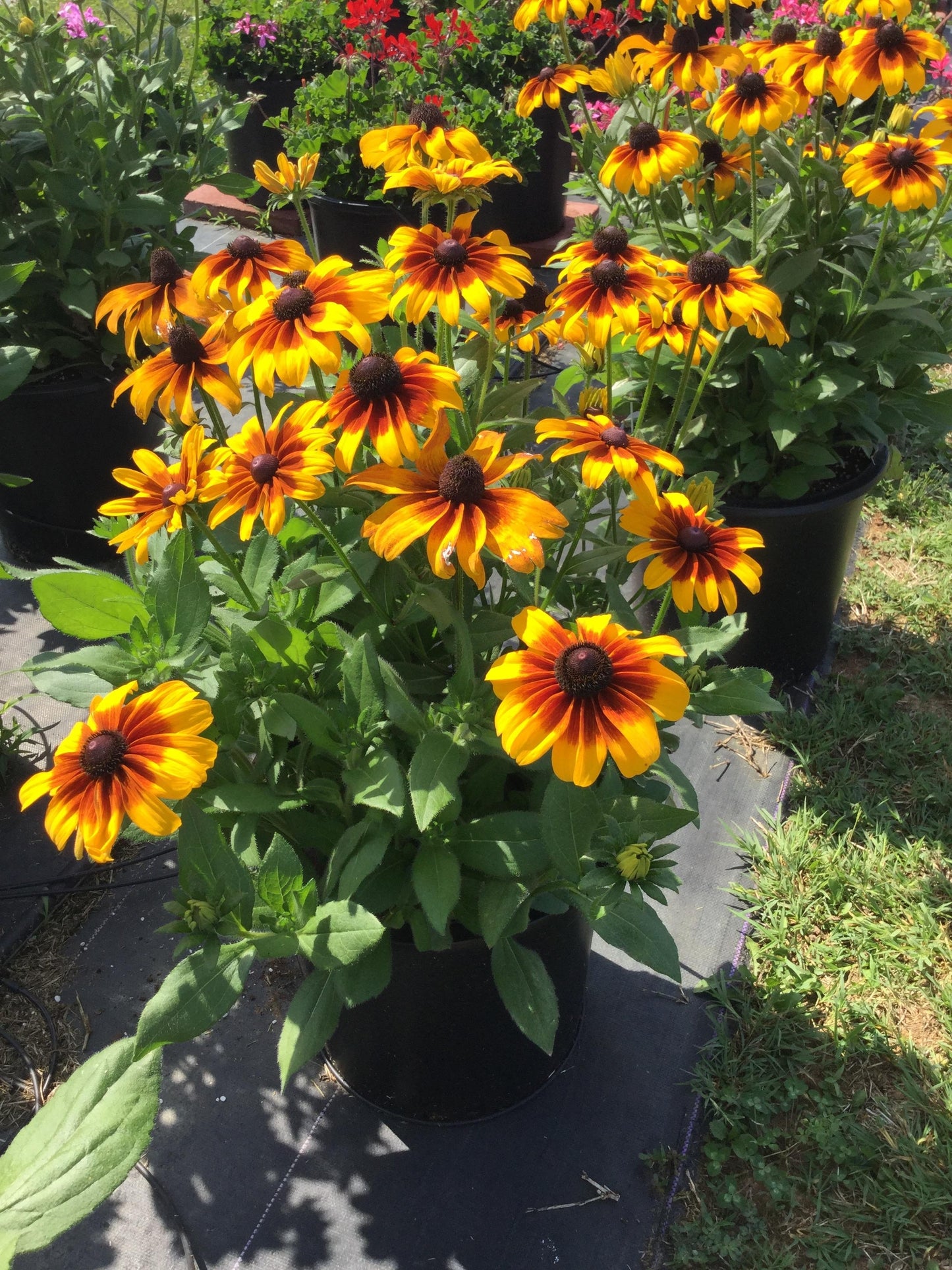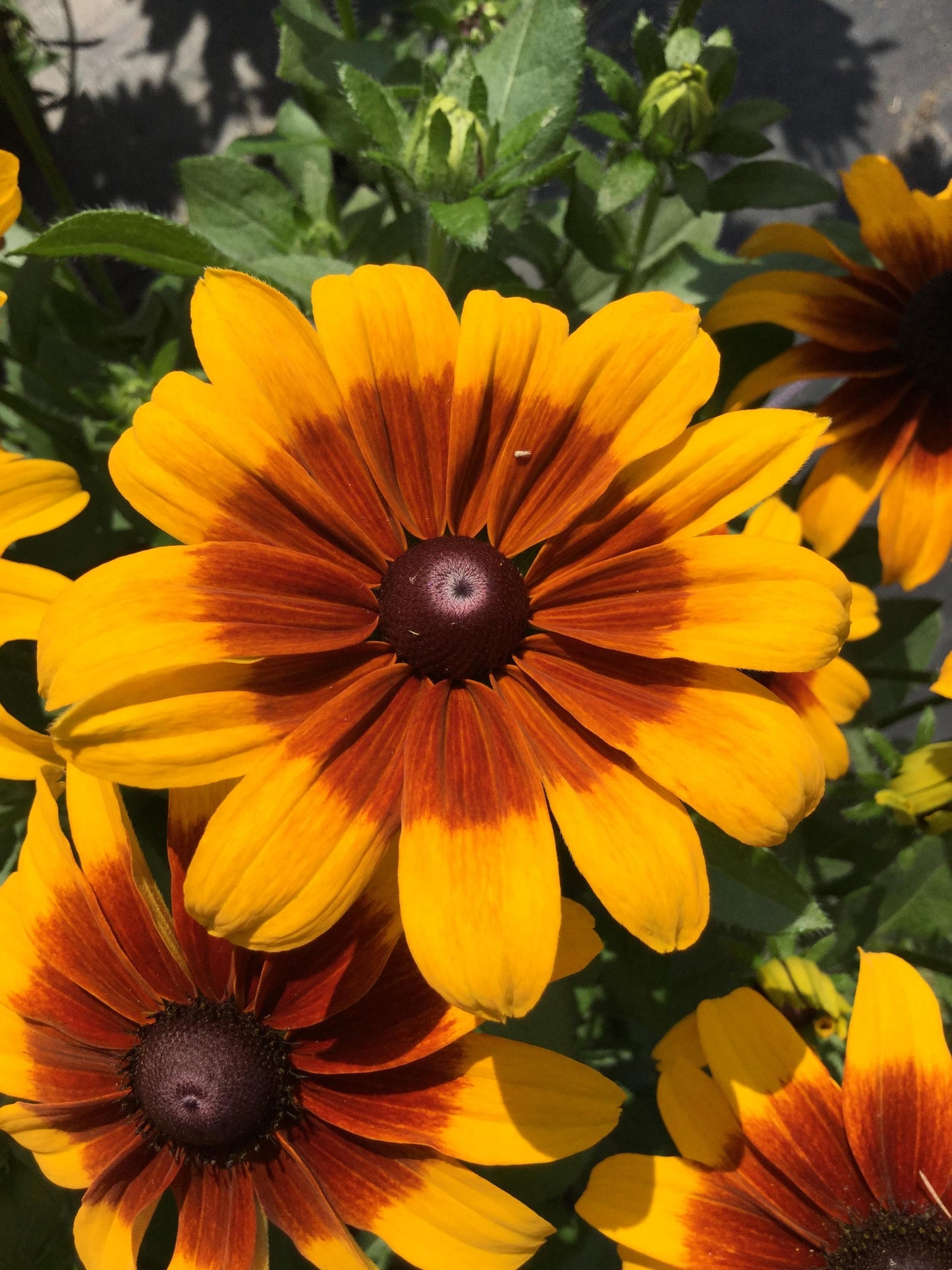Rudbeckia 'Rising Sun Chestnut Gold'
Rudbeckia 'Rising Sun Chestnut Gold'
Rudbeckia 'Rising Sun Chestnut Gold' Growing Guide
Plant Description:
Rudbeckia 'Rising Sun Chestnut Gold' is a striking, warm-toned variety of the Black-Eyed Susan, known for its large, daisy-like flowers with rich chestnut-brown petals that fade into a golden yellow near the tips. The dark brown or black central cones add contrast, making it a standout in the garden. This cultivar is valued for its long blooming season and is an excellent choice for late summer to fall displays. The flowers are also long-lasting and make excellent cut flowers.
Native Range:
Rudbeckia species are native to North America, particularly to prairies, meadows, and open woodland areas. They are commonly found across the United States and Canada.
USDA Growing Zones:
Rudbeckia 'Rising Sun Chestnut Gold' thrives in zones 4 to 9, making it adaptable to a wide range of climates.
Height and Width:
- Height: Typically grows between 24 to 36 inches (60 to 90 cm) tall.
- Width: Spreads about 12 to 18 inches (30 to 45 cm).
Light Requirements:
Prefers full sun, where it will bloom most prolifically. It can tolerate partial shade, but flower production may be reduced in lower light conditions.
Soil Requirements:
It thrives in well-drained, moderately fertile soils but is quite adaptable. Rudbeckia can tolerate poor soils and even clay as long as drainage is adequate. Adding compost or organic matter to the soil can improve performance.
Watering:
Rudbeckia 'Rising Sun Chestnut Gold' prefers moderate watering, especially during dry periods. Once established, it is drought-tolerant, but regular watering will encourage better blooms. Avoid overwatering or letting the soil become soggy.
Temperature and Humidity:
This plant enjoys warm summer temperatures and can tolerate humidity. It's a hardy plant that can withstand varying weather conditions but should be protected from prolonged drought in very hot climates.
Uses:
- Ornamental: The large, eye-catching blooms make this Rudbeckia an excellent choice for borders, cottage gardens, meadows, and mass plantings.
- Pollinator-Friendly: It attracts butterflies, bees, and other pollinators, making it a great addition to wildlife gardens.
- Cut Flowers: The flowers are ideal for cutting and can last a long time in floral arrangements.
- Low Maintenance: Due to its resilience and minimal care requirements, it is often used in low-maintenance or xeriscape gardens.
Maintenance:
Rudbeckia is a low-maintenance plant but benefits from deadheading to encourage continued blooming. Pruning back in late fall or early spring helps tidy up the plant. It may self-seed in the garden if the spent flowers are left on the plant.
This variety of Rudbeckia offers a beautiful burst of late-season color and is perfect for naturalized plantings, pollinator gardens, and cut flower beds. Its hardiness and easy-care nature make it a popular choice for gardeners.
---SHIPPING NOTICE PLEASE READ BEFORE PURCHASING LIVE PLANTS!---
We WILL NOT refund the purchase of or the shipping cost of live plants purchased with the intent to be shipped to states that do not authorize importing live plants or to states with restrictions! Purchases to these states will be held for 30 days for pick-up at our Slidell, Louisiana store and the shipping cost associated with these purchases will be held for the care of the plant while waiting to be picked up. All sales are final. If the plant(s) purchased are not picked up within 30 days from the date of order, these items will be returned to our sales inventory and you WILL NOT be refunded. Thank you for understanding these policies.
Due to regulations, certain states have restrictions on importing plants. Please review the list below to ensure you're not attempting to order any restricted plants in your area.
**Important Note:** We do not ship any plants outside the U.S.
State-Specific Restrictions - We ARE NOT responsible for any plant(s) that are not listed in these restrictions. Purchaser bears all responsibility for making sure the plant(s) they desire to purchase are not banned from being imported to the shipping state:
Arizona: Juglans spp.
California: Castanea spp., Juglans spp., Pinus spp., Quercus spp.
Colorado: Some counties restrict Prunus spp. Please verify your local county regulations.
Florida: Castanea spp., Cornus spp., Quercus spp., Cornus mas
Georgia: Vaccinium spp.
Hawaii: Pinus spp.
Idaho: Humulus lupulus, Mentha spp., Vitis spp.
Indiana: Fragraria spp., Rosa spp.
Kansas: Juglans spp.
Michigan: Abies spp., Vaccinium spp.
Montana: Pinus spp.
Nevada: Allium spp.
Mentha spp.
New Jersey: Rosa spp.
New York: Vitis spp.
Oregon: Allium spp., Castanea spp., Corylus spp., Humulus lupulus, Quercus spp., Sambucus nigra, Ulmus spp., Vaccinium spp., Vitis spp.
Texas: Juglans spp.
Washington: Allium spp., Castanea spp., Corylus spp., Humulus lupulus, Vaccinium spp., Vitis spp.
Wisconsin: Abies spp., Pinus spp., Picea spp., Mentha spp.
Additionally, we cannot ship plants in soil medium to the following states: AK, AL, AR, AZ, CA, HI, ID, KS, MS, MT, ND, NM, NV, OK, OR, SD, TX, UT, WA.
Couldn't load pickup availability




